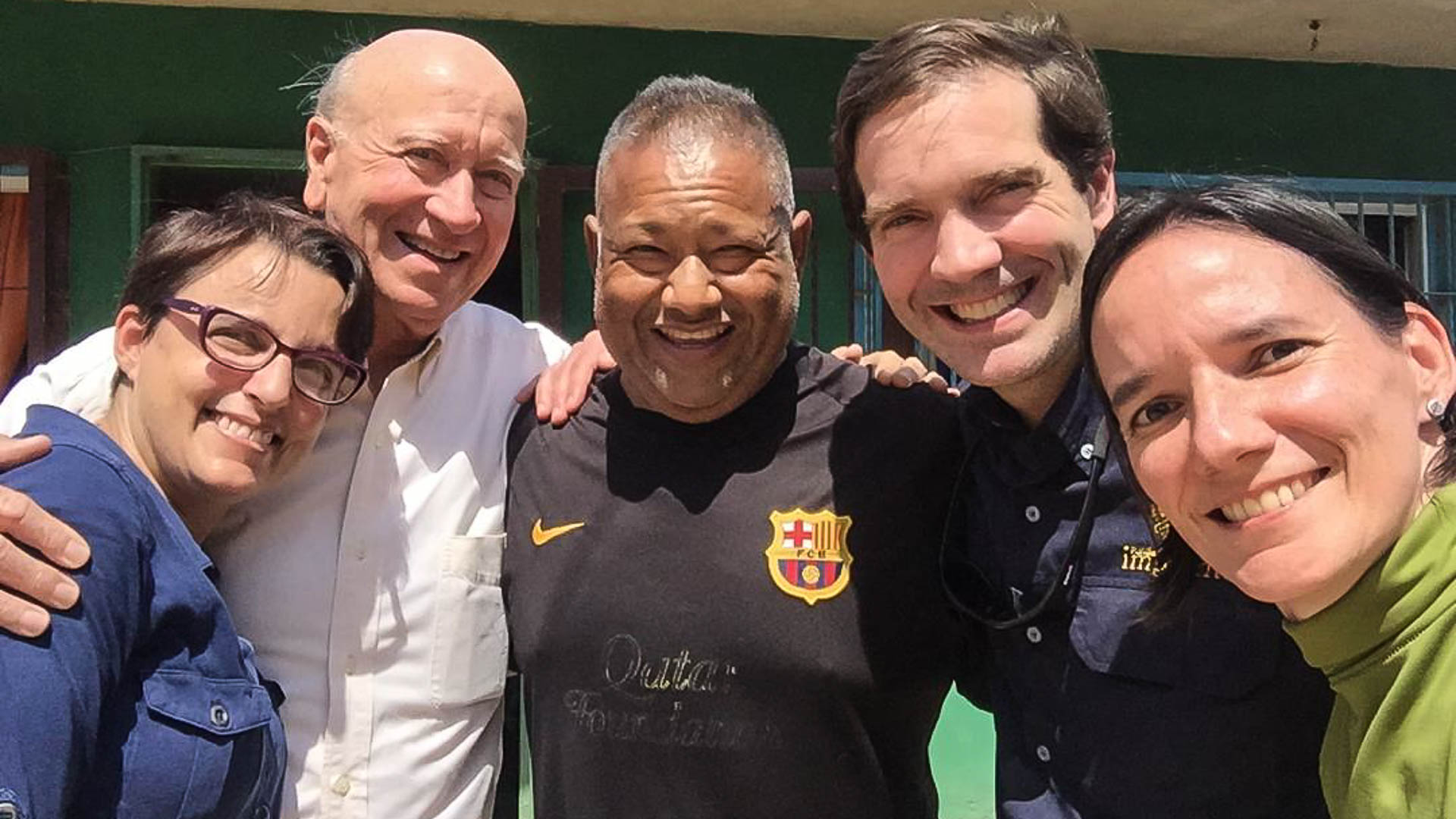

Henry spends much of his time helping his neighbors in Caucagüita —the parish in the Sucre municipality, state of Miranda, where he lives— and maintaining a soup kitchen that provides food to about fifty-seven children on a daily basis. This he does as a way of keeping his mind away from a shadow that looms over his own life.

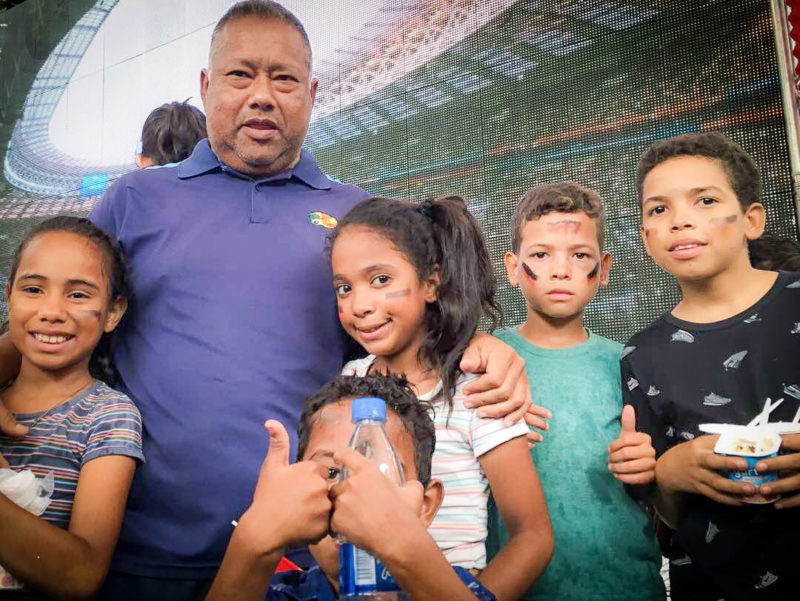 Personal Photo Album
Personal Photo Album
In the forty-two slums that are the steep hill of Caucagüita, one of the three parishes of the Sucre municipality, state of Miranda, east of Caracas, Henry Vivas is a well-known figure. Many know him as a man who genuinely and disinterestedly helps others. There’s not a single person there that he hasn’t done something for.
Nobody in the community forgets the day, just over eight years ago, when he managed to get the members of two criminal gangs led by Gamelote and Pilito —who are said to be responsible for most of the kidnappings and robberies registered in Caracas in 2010— walk in line to La Embajada, which is the area where Henry lives, and place their guns and grenades in a ditch to face each other on the court with a ball as their only weapon.
“I was coming back from the hospital. I felt awful, but the opportunity presented itself and you had to take advantage of it,” recalls Henry. The chamos were bad people, very bad, but they looked like movie actors, and when they got on that court, they played like kids all night long. They were running all over the place, taking off their shirts, and betting their Berettas and light automatic rifles. The people from the barrio came up to watch the game because they said that as long as I was there, they would not dare to do anything. That is why I wouldn’t leave, even though I was feeling tired.”
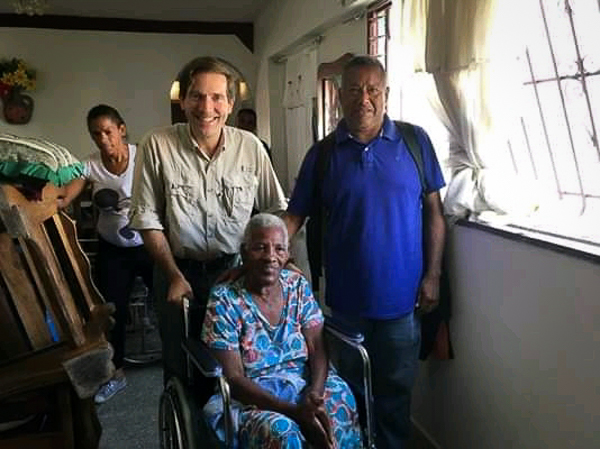
The sun in Caucagüita shines so brightly that you would think you could touch it with your bare hands if you stretched up a little. It is hot there. There is always that sticky heat that seems to get worse as one goes up the steep slopes. Or as one climbs the stairs of its dark, washed-out buildings. And that is exactly what Henry is doing at this very moment: it is a day in early June 2019 and, accompanied by the doctors, nurses, journalists, and cameramen who have come to document his work as a piece of good news that ought to be spread, he climbs the eight floors of one of the buildings in Las Guacamayas. They go to Rosa’s apartment. Rosa is a young woman who was left handicapped by a stray bullet and has been a prisoner in her own house ever since. She has a wheelchair because Henry helped her get one. After that, they go to Mrs. María’s, who has ulcers in her legs and has not interrupted her high-blood pressure treatment because Henry drops by her house to provide it to her every single month.
About every ten minutes, Henry stops to ask if anyone is thirsty. At one point, he goes back into an apartment and comes out with a pitcher filled with iced water. He gives it out. But even though he too is thirsty, he does not allow himself to drink. Not even a small sip. Nothing.
A journalist wants to know how the people of the shantytown thank him for the work he does.
“I hand over what has to be handed over and then I leave in a hurry because I don’t like people thanking me,” he replies.
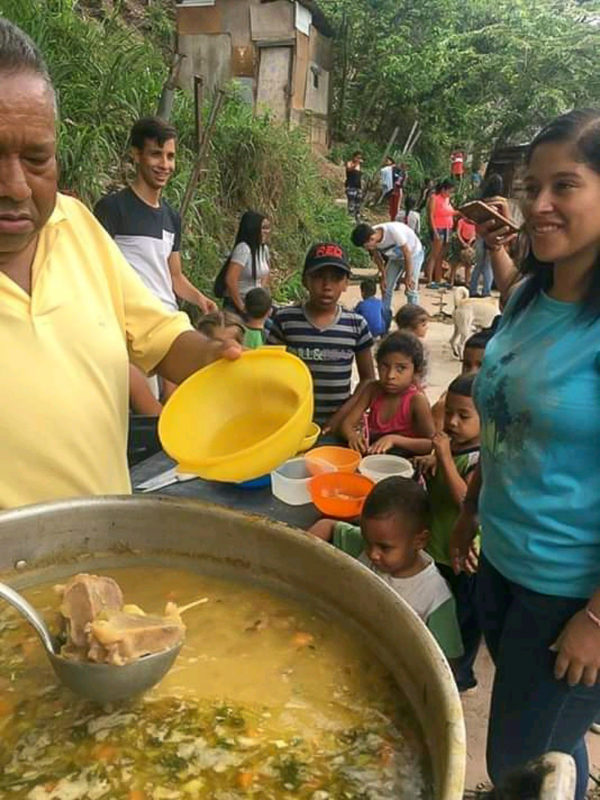
His house is also the site of a soup kitchen that feeds fifty-seven children from the area, which is funded by the Alimenta la Solidaridad [Feed Solidarity] food program. For almost a year now, every afternoon, from Monday to Friday, the children arrive and Henry helps to serve.
It is an afternoon in early July and Henry pours ground beef stew and rice into the plastic containers the children bring from home. He also serves them a cup of gruel that he spoons out from a steaming pot. He licks his lips each time he lifts a portion.
The smell of the meat takes over the space and, as he fills more little cups, Henry moves away from the stoves, as if he was trying to block that scent. He walks from one end to the other. He asks the same people up to three times if they want to eat.
In the meantime, Delia, his wife’s aunt and fellow community worker, draws water from a container that stands near the fridge and fills the cups that she would place on the counter for anyone who is thirsty to drink. Henry stops serving the gruel for a moment and stares at the empty cups the children leave in the kitchen once they are finished. One of the kids approaches him and asks him for more water. He offers him a cup. “Ahhh!” the child says in delight as he drinks up.
“Henry, why don’t you come and eat? You must be hungry,” shouts one of the little ones.
“Because if I eat, I could die. Are you nuts?!” he answers before he hides behind the curtain of his room.
But soon everyone, even Honter, the house’s dog, would demand his presence, his help, his involvement. So, Henry sits on the edge of the bed in his room, which is only lit by the light from outside that enters through a window, takes a breath, tucks his shirt in, puts on his shoes, and gets out. As he crosses his room’s curtain, he seems to leave his own drama behind to face that of others.
He sits on a piece of furniture and pets Honter, until the dog puts on a face that resembles a smile.
A neighbor arrives at the house looking for him and asks when the next medical screening day is scheduled for the neighborhood because his son was not checked up during the last one. Then, Delia tells Henry that they are going to have to feed yet another starving family from the area.
“You look so bloated…” she adds.
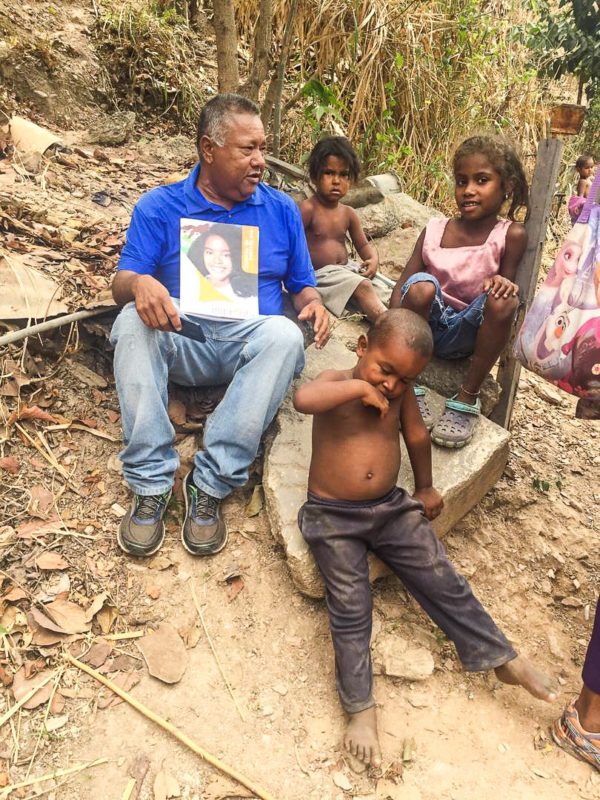
“That is all in your head, woman. Let’s talk about that family. Tell me about it,” he says, as he turns his face away a little in an effort to diverting Delia’s attention, who was staring at his yellowish eyes.
His face was round and puffy.
Nineteen years ago, when Henry was 30 and about to be promoted to manager of the bank branch where he worked, he underwent routine tests that suggested some sort of irregularity; although the results were inconclusive, there was reason for alarm: something was wrong with his kidneys. The doctors ordered a biopsy to find out what it was. It would be, as they told his mother, “a simple procedure”.
He was admitted to the El Algodonal Hospital to have the biopsy performed, but it had rained heavily and part of the facilities of the medical center was flooded with sewage, and he got an infection.
The results of the biopsy were definitive: Henry had kidney failure. One of his kidneys had stopped working, and the function of the other one was down to 20 percent. From that moment on, he joined a list of 11,478 dialysis patients in Venezuela, and he must spend half a day in a hospital, three times a week, so that they plugged him into a machine that filters his blood and removes the toxins that his kidneys are not capable.
“Mom, I’ll just die if I have to connect myself to a machine, if I have to be reliant on a machine,” he told Nancy upon learning the news.
It had been ten months since the diagnosis but Henry was yet to start treatment. He refused to get dialysis. One Sunday, though, which fell on a Mother’s Day, that missed time began to wreak havoc on is body: they found him lying in his bed, face down, and swollen like a monster. They all rushed and called relatives, friends, and acquaintances. He needed to be taken to a health care center, soon. Someone managed to find a place for him in the Military Hospital and he was taken there. Shortly after he was admitted, they warned him: either he was plugged into the dialysis machine right away or he would die that very night.
Henry refused once again, but then a doctor told him bluntly:
“I can’t possibly waste time on someone who doesn’t want to live. You have to decide if you want to live on or if you want us to let you die, so I can tend to other things.
That is when he came to his senses. He decided that he would live. He returned home processing the idea that he would have to commit three days a week to dialysis if he wanted to stay alive.
And if he wanted to be able to help others.
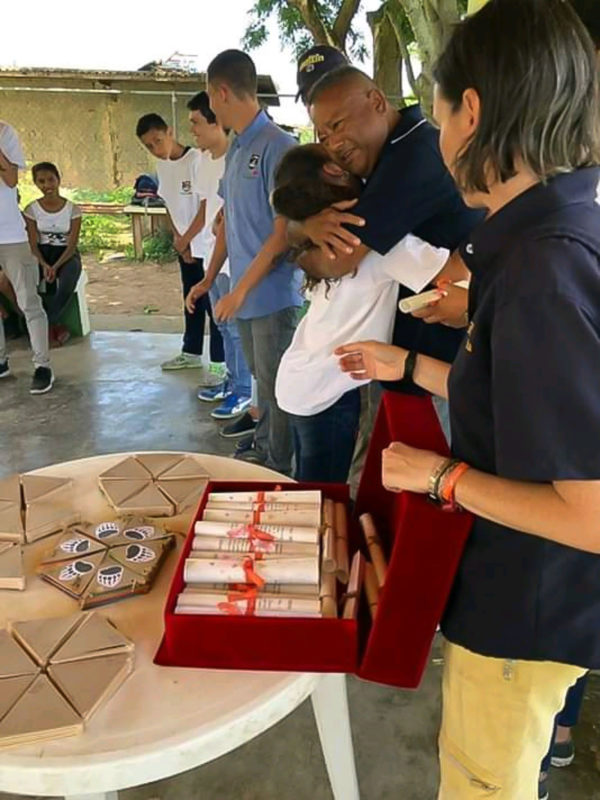
Dialysis in Venezuela is a privilege, and Henry has it, unlike the 5,000 kidney patients who died between 2017 and 2019 without his same luck. This afternoon, though, as Henry is serving lunch at home, it has been a week since he was last dialyzed at the Dr. Miguel Perez Carreño Hospital in western Caracas because the filter of the tank that feeds water into the machines is damaged.
That is why he is so swollen and gasping. He is awash with the toxins produced by his own body. He retains fluids and is not allowed to drink water. He cannot eat either, because his body cannot process food. At this very moment, food is like poison that can eat up his energy, prevent him from walking, trigger delirium and violence, and even make him lose consciousness.
It is not the first time that he has had to interrupt his dialysis treatment, but now the issue is making him more anxious. In an 18-month span, Henry has seen more than half of his fellow kidney patients at the Pérez Carreño Hospital die, either because they lacked the medication they needed, or because they got an infection, or because they got contaminated with bacteria borne in the water used during the procedure, or because they were not taken care of, or because their treatment had to be delayed.
Henry must deal with his thirst and everything that goes on around him, and the only way he has found to appease his hunger and thirst is by easing the hunger and quenching the thirst of others. Without anyone knowing, he helps others in order to help himself. He gives to receive, and he has done so for 18 years, which he hopes will be many more, because, in his own words, he’d rather live with a thirst for helping others than die full of selfishness.
He uses to repeat that he comes from the plains, and that men there are known for their grit, not for their afflictions.
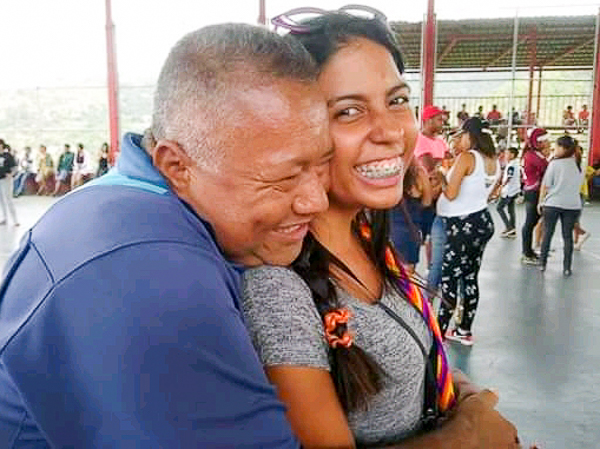
Translation: Yazmine Livinalli

This story was written within the framework of the Thirteenth Cigarrera Bigott Narrative Journalism Seminar, 2019
2295 readings
I am a Central University of Venezuela journalist trained in the old good times of the Últimas Noticias newspaper. I am a community reporter who tries to put the spotlight on what’s happening in our country’s slums. I am interested in writing about human rights violations and stories that prove that there are still good people in this world.